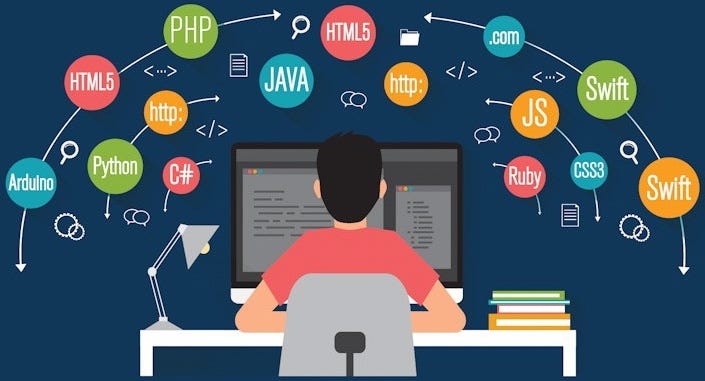
Computer Coding & its Languages
Computer programming or coding is the composition of sequences of instructions, called programs, that computers can follow to perform tasks. It involves designing and implementing algorithms, step-by-step specifications of procedures, by writing code in one or more programming languages
To speak with computers, programmers learn different coding languages. Binary code is the primary language of all computers. Binary code consists of only two numbers: one and zero. In the binary coding language, zero represents off
while one represents on.
Binary is still used with electronics and computer hardware. Programmers can use binary to control the flow of electricity and the positive and negative poles of a magnet. Binary code allows programmers to create simple instructions and procedures for computers.
Low-Level vs. High-Level
Computer programmers split coding languages into two groups: low-level and high-level.
Low-level languages, like binary, are considered “machine-oriented.” Machine-oriented languages write instructions that must be specified in terms of the capabilities of the processor in question. Coders also refer to low-level languages as assembly language or machine code.
High-level languages are user-oriented. Most of the popular coding languages, such as Python, fall under this category. Programmers designed high-level languages to convert an algorithm into program code more easily. High-level coding languages are closer to human language — they include more nuance and adaptability than low-level coding languages.
Coding vs. Programming
A lot of people think coding and programming are the same thing. Coding, however, is only one small part of programming.
Coding is the process of allowing humans to speak to computers. As computers only understand binary language — a series of zeros and ones — humans need to use a programming language as a translator of sorts.
Programming, on the other hand, includes not only coding but also the digital product’s planning, testing, deployment, and maintenance.
Coding Bootcamps for You
Benefits of Learning Coding
Learning a new skill always has its benefits but learning how to code is one skill with many benefits.
Benefits of Coding
- Elevate your career prospects: Regardless of whether you work in the tech industry, learning at least one programming language can help you stand out from the competition in an interview process or help you negotiate a higher salary.
- Improve your problem-solving skills: Many people who learn to code report an improved ability to break problems down into smaller pieces and approach problems with clearer, linear thinking.
- Cultivate creativity: Coding gives you the ability to create anything you can dream of.
- Community: There are countless online communities for coders to exchange tips and tricks and chat and meet each other.






